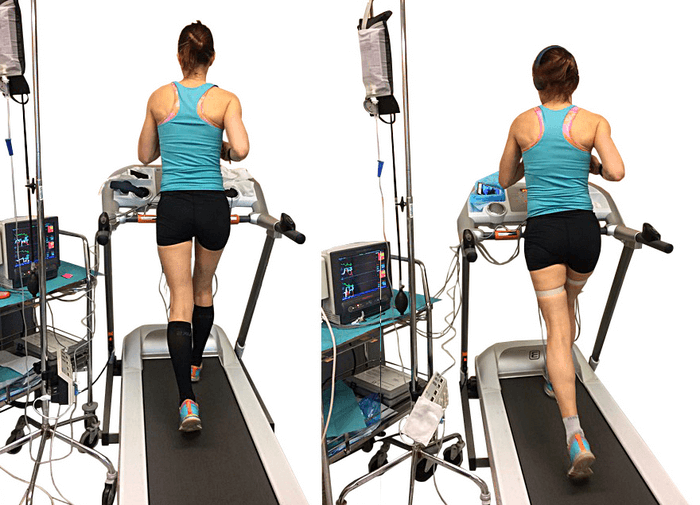GOTHENBURG, Sweden — Compression stockings, a popular fashion choice among runners, might actually be hurting your performance. New research suggests there is no scientific evidence supporting claims that these socks help people run better. Instead, study authors found that the tight fabric reduced the amount of oxygen a runner’s lower leg muscles receive.
Compression stockings place pressure on the lower legs with the intended purpose of maintaining blood flow. Gentle squeezing from the stockings is intended to push blood flow up the leg, which can reduce muscle soreness and allow your legs to recover quicker. While companies advertise the garments as a performance enhancer, Swedish researcher at the University of Gothenburg beg to differ.
“There have been a few studies in the past on the effect of compression stockings, but the results have been contradictory,” says Sophia Halldin Lindorsson, a specialist in orthopedics and PhD at Gothenburg’s Sahlgrenska Academy, in a university release. “Our study is the first in which the intramuscular oxygenation and pressure have been measured before, during and after running.”
The team recruited 20 experienced runners and instructed them to run 6.3 miles on a treadmill. Participants ran two times, once with compression stockings and once without. A catheter recorded the intramuscular pressure in the front muscle of the lower leg. Sensors attached to the skin recorded local oxygenation in the muscles.
Wearing compression socks caused a noticeable increase in pressure in the lower-leg muscles. Running with compression stockings caused an average intramuscular pressure of 22 mm/Hg (millimeter of mercury). Compression stockings also reduced the amount of oxygen going towards the muscles by 11 percent when compared to the run without compression socks.

Medical compression socks can still help those with leg issues
Before and after both running sessions, the research team took blood samples from each participant. In the blood samples, they searched for signs of myoglobin and creatine kinase. These are two markers associated with muscle damage. There were no signs of these muscle damage markers, even when participants wore compression stockings.
“This finding, along with the reduced oxygenation in the musculature, supports previous theories that compression stockings have no performance-enhancing effect in healthy people,” explains Lindorsson.
The study authors note the findings are only related to compression stockings for running. Previous studies have found that medical compression stockings may help certain patients improve their blood circulation by increasing pressure in the leg. Doing so has been shown to help prevent blood clots and swelling.
Beyond the average runner, the research team looked at the benefits of compression socks for people diagnosed with chronic exertional compartment syndrome. People with this disorder experience excess pressure in their lower leg muscles during exercise. The abnormally high pressure leads to uncomfortable swelling and muscle pain.
“Chronic exertional compartment syndrome is a pain condition that many people probably suffer from without knowing. It’s also often missed when they see the doctor, probably because the pain goes away at rest,” Halldin Lindorsson says. “I’ve met a lot of patients who have had pain in their lower legs from exertion for as long as they can remember, and thought they had to live with it. But there’s an operation that helps, and my research have shown that the treatment has good results. If more people knew about this diagnosis, a lot of them would avoid unnecessary suffering.”
The study is published as part of Lindorsson’s doctoral thesis for the University of Gothenburg, Sweden.


Compression stockings create pressure and diminish blood flow- now there’s a novel concept. Pure genius I’d say.